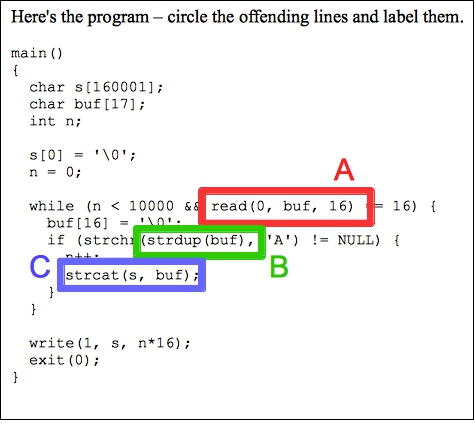 |
 |
while (n < 10000 && fread(buf, 1, 16, stdin) == 16) {
|
if (strchr(buf, 'A') != NULL) {
|
strcpy(s+n*16, buf); |
You could call strcat() too and it would fix the problem as well.
UNIX> time q1 < q1-c.txt > /dev/null 1.577u 2.882s 0:04.46 99.7% 0+0k 0+1io 0pf+0w UNIX> time q1-fix-A < q1-c.txt > /dev/null 0.982u 0.113s 0:01.09 100.0% 0+0k 0+1io 0pf+0w UNIX> time q1-fix-B < q1-c.txt > /dev/null 1.320u 2.742s 0:04.06 100.0% 0+0k 0+1io 0pf+0w UNIX> time q1-fix-C < q1-c.txt > /dev/null 1.008u 2.859s 0:03.87 99.4% 0+0k 0+0io 0pf+0w UNIX> time q1-fix-all < q1-c.txt > /dev/null 0.162u 0.030s 0:00.19 100.0% 0+0k 0+0io 0pf+0w UNIX>
 |
#include <stdio.h>
#include <string.h>
#include <stdlib.h>
#include <sys/stat.h>
#include <dirent.h>
main()
{
DIR *d;
char *filename;
struct dirent *de;
struct stat buf;
int any;
any = 0;
d = opendir(".");
if (d == NULL) { perror("opendir ."); exit(1); }
for (de = readdir(d); de != NULL; de = readdir(d)) {
if (stat(de->d_name, &buf) == 0) {
if (S_ISDIR(buf.st_mode) && strcmp(de->d_name, ".") != 0 &&
strcmp(de->d_name, "..") != 0) {
filename = (char *) malloc(sizeof(char) + (strlen(de->d_name) + 10));
sprintf(filename, "%s/f1.txt", de->d_name);
if (stat(filename, &buf) == 0) {
printf("%s\n", filename);
any = 1;
}
free(filename);
}
}
}
closedir(d);
if (!any) printf("None Found\n");
exit(0);
}
|
And the second is in q2-2.c:
#include <stdio.h>
#include <stdlib.h>
#include <sys/stat.h>
#include <dirent.h>
main()
{
DIR *d1, *d2;
struct dirent *de1, *de2;
struct stat buf;
int any;
any = 0;
d1 = opendir(".");
if (d1 == NULL) { perror("opendir ."); exit(1); }
for (de1 = readdir(d1); de1 != NULL; de1 = readdir(d1)) {
if (stat(de1->d_name, &buf) == 0) {
if (S_ISDIR(buf.st_mode) && strcmp(de1->d_name, ".") != 0 &&
strcmp(de1->d_name, "..") != 0) {
d2 = opendir(de1->d_name);
if (d2 == NULL) { perror(de1->d_name); exit(1); }
for (de2 = readdir(d2); de2 != NULL; de2 = readdir(d2)) {
if (strcmp(de2->d_name, "f1.txt") == 0) {
printf("%s/%s\n", de1->d_name, de2->d_name);
any = 1;
}
}
closedir(d2);
}
}
}
closedir(d1);
if (!any) printf("None Found\n");
exit(0);
}
|
A large number of you tried a recursive solution that printed out all files reachable from the current directory whose names are "f1.txt". That does not fit the problem description.
 |
Let's draw memory, in four-byte chunks from address 0x100130 to 0x10016c:
0x100130 | 0x100140 | p[0] 0x100134 | 0x100150 | p[1] 0x100138 | 0x100160 | p[2] 0x10013c | unknown | 0x100140 | 0x100 | p[0][0] 0x100144 | 0x101 | p[0][1] 0x100148 | 0x102 | p[0][2] 0x10014c | unknown | 0x100150 | 0x110 | p[1][0] 0x100154 | 0x111 | p[1][1] 0x100158 | 0x112 | p[1][2] 0x10015c | unknown | 0x100160 | 0x120 | p[2][0] 0x100164 | 0x121 | p[2][1] 0x100168 | 0x122 | p[2][2] 0x10016c | unknown |From that, we know that:
UNIX> gcc -m32 q3.c UNIX> a.out p: 0x100130 p[0]: 0x100140 p[1]: 0x100150 p[2]: 0x100160 A: 0x100134 B: 0x100154 C: 0x111 D: 0x112 E: 0x100140 F: 0x121 UNIX>
 |
proc:
push #12
mov #15 -> %r0
st %r0 > [sp]--
ls [fp+16] -> %r0
st %r0 -> [sp]--
jsr d
pop #8
mov #4 -> %r0
ret
|
So, given that:
 |
a:
push #4 // Allocate i
st %r2 -> [sp]-- // Spill r2
l1:
jsr c // Do (c() + d())
mov %r0 -> %r2
jsr d
add %r2, %r0 -> %r0
cmp %r0, %g0 // > 0
ble l2
ld [fp+12] -> %r0 // b += 5
mov #5 -> %r1
add %r0, %r1 -> %r0
st %r0 -> [fp+12]
b l1
l2:
ld [fp+12] -> %r0 // return b
ld ++[sp] -> %r2
ret
|
 |
ld [fp] -> %r0 // Load i into r0 mov #4 -> %r1 // Load 4 into r1 mul %r0, %r1 -> %r0 // Multiply i by 4, product in r0 ld [fp+12] -> %r1 // Load p into r0 add %r0, %r1 -> %r0 // Add i*4 to p. This is &(p[i]) ld [r0] -> %r0 // Get p[i] ld [r0] -> %r0 // Get *p[i] ret |
 |